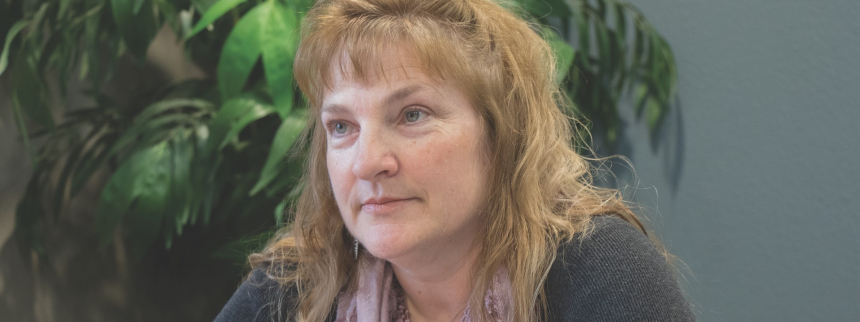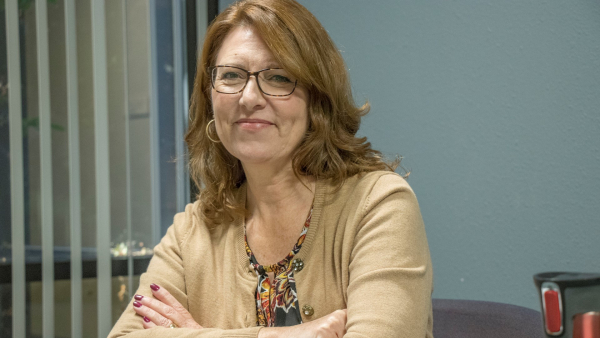
In photo above, Loree Lippsmeyer is the Diocese of Sacramento's pastoral care coordinator for victims of abuse.
The calls are not frequent and they often involve cases from years ago. And at times, the callers have rarely if ever shared their stories before.
When someone calls the Diocese of Sacramento’s victim assistance hotline, he or she will reach Loree Lippsmeyer, a licensed associate social worker, who is available to assist persons who have suffered sexual abuse by members of the Catholic clergy or other church personnel. She helps them obtain support for their needs and if warranted, make a formal complaint of abuse to the diocese.
“Healing for victims is a journey,” says Loree, a member of Presentation Parish in Sacramento, who began in her role as the diocese’s pastoral care coordinator for victims of abuse in December. “Victims may have already started to heal, or this might be a very first move in their healing. But I think it’s an important piece to try to reconcile their difficult situations. I want to be a safe place for them to tell their stories.”
Loree holds a double master’s degree in mental health as well as a pupil personnel services credential. She has worked with the Catholic Counseling Agency, a private therapy practice in Fair Oaks, and has previous experience in therapy with victims of sexual abuse. She also served as a patients’ rights advocate for severely mentally ill clients in a locked mental facility and as a therapist with the children’s psychological clinic in Auburn during the late 1990s.
As victim assistance coordinator, “what I want to do is be a part of bringing something to light and help be an instrument of God’s healing,” she says. “I always keep in mind that our faith is primary. Our church is made up of people who are fallen -- we are in a broken world with broken people.”
She admits serving as victim assistance coordinator is “not an easy job to take on.”
“In discerning if I was called to do this type of work, I felt that God has always given me the grace for things he calls me to. I just rely on my faith in God. I’ve been through many difficult situations, such as working in a locked mental facility. This is a way that God would have me serve others.”
What does the diocese offer to victims of sexual abuse? Pastoral care can include individual counseling, spiritual support, group therapy or other assistance that may be necessary to facilitate healing. The offerings can be tailored to each person who goes through Loree as the victim assistance coordinator.
There is a victim assistance coordinator in all 197 U.S. dioceses and eparchies, as mandated by the Charter for the Protection of Children and Young People, which the U.S. Conference of Catholic Bishops put into practice in 2002 after a wave of sexual abuse cases within the church came to light.
Article 2 of the charter states that “dioceses/eparchies are to have a competent person or persons to coordinate assistance for the immediate pastoral care of persons who report having been sexually abused as minors by clergy or other church personnel.” According to charter guidelines, the coordinator’s information is advertised in Catholic Herald magazine, on the diocesan website and in all parishes of the diocese.
Loree succeeded Cathi Fisher, who served as victim assistance coordinator from December 2009 to November 2018. Cathi, a licensed clinical social worker and a member of St. Rose Parish in Roseville, brought to her position a background in child therapy, sexual abuse therapy and working with victims of trauma. As she was transitioning out of her role, she spoke with Catholic Herald magazine about some of her experiences.
When the victim assistance coordinator gets a call, her role involves some triage. If a case deals with the current or potential abuse of minors, civil authorities are contacted immediately, because the current safety of the child is the priority, Cathi says.
Cathi describes what often happened during her initial conversation with a victim.
“I’m just listening,” she says. “I’m trying to hear what they want to say. At the end of the conversation, I ask if it is OK to ask some specific questions to get more details that are needed for a report, whether the abuse occurred in our diocese or not.
“I don’t want to scare the victim off, and that can happen, where they feel they will be re-violated. They may want to meet in a public place, rather than come to my office, as they don’t want to come to a place associated with the Catholic Church. One time I went to someone’s home, as that’s where the victim was comfortable.”
Cathi adds: “Trauma and abuse are not things you are going to erase out of their lives. You are trying to do some healing, how to turn off some of those triggers so they are not in a constant state of hyper-vigilance or alert around priests or churches, or whatever the situation is. You can help them manage the trauma and hopefully decrease it to a point where their body doesn’t take over and react to it.
“If someone calls in, the response depends on what their situation is – are they a minor or are they an adult? There are adults who were victims of sexual misconduct, and victims who are minors or were minors at the time and are just now reporting the abuse. If they were a minor at the time of the incident and they are an adult now, we still encourage them to make a police report even if they think a crime didn’t occur, just because we want to cover all bases. With everyone who calls, I did an assessment, an intake and a report, spending a few hours with them to find out who, what, where, when and how.”
Cathi also assessed the caller’s situation regarding the appropriateness of or request for counseling. Some callers decide after their first call they don’t need any further counseling or contact. Others do want assistance from the victim assistance coordinator. Sometimes the caller wants to make a statement or may eventually want an apology from someone. She also covered confidentiality with callers, telling them she has a requirement to report anything immoral or illegal done by someone associated with the church, whether they be clergy or laity, employee or volunteer.
Because the victim assistance coordinator is not a member of the clergy nor a diocesan employee, she can be seen as a more neutral third party to those wanting help, Cathi says. If the victim does want contact with the church, Bishop Jaime Soto or another clergy member has met with him or her. “Sometimes people don’t want to see a priest, if there’s a lot of anger,” she notes. “But sometimes they do, and sometimes it’s helpful for them to meet and hear a sincere apology and put a face to that.”
Bishop Soto is open to meeting with victims. “His only caveat was that I had met with the victim and that they were ready, otherwise it wouldn’t be helpful,” Cathi says. “Have they gone to counseling and does the therapist say they are ready? Bishop Soto has met with several of our victims. I was present for a couple of those meetings.”
Callers to the victim assistance coordinator don’t always fall under the category of minors who have been sexually abused by Catholic clergy, employees or volunteers of the Diocese of Sacramento. Callers could be reporting sexual abuse by a member of a religious order or by a clergy member from another diocese, for example. Or it could be a victim was abused outside of the state but is now living in the diocese or vice versa. The person should still call in, because to Cathi, that did not matter.
“I see very little reason for a person not to be helped,” she notes. “Our diocese is generous and helpful in many cases. I still do the full intake report, because if the victim is in our diocese and they’ve called us, we do what we can for them. Then they are referred to the appropriate diocese or religious community for follow-up.”
Cathi viewed her role as supporting and advocating for survivors of abuse. “If a victim received counseling or other services from the diocese and didn’t get fully healed or what they needed, I asked for his or her case to be reviewed again. Or if someone is looking for a spiritual director, I would help. Sometimes the victims haven’t lost their faith and hope in the priesthood and in the Catholic Church. It is so individual what a survivor will want.”
At times Cathi had a parent call in for their child, who was a sexual abuse victim. “Sometimes those victims are in their 20s or 30s and are not willing to come forward,” she says. “And the parent is flustered and wants them to report, but they just aren’t ready yet. I try in that case to reach out with an email or phone call. Sometimes I didn’t hear back. Then I would talk to the parents and say it has to be the victim’s decision. We can’t force them to tell about their abuse.”
Cathi reflects that her nine years as victim assistance coordinator was “an eye-opening experience. You can’t be naïve and do this job.”
Before she started in her role, she recalls that Bishop Soto in an interview asked her, ‘How strong is your faith?”
“I responded, it’s pretty good. He said even if you think it is good, it will be tested,” Cathy notes. “And he was right. It’s hard to hear some of the stories in our diocese, as it is to hear many of the revelations from across the country.”
Loree will build on Cathi’s work as victim assistance coordinator, interacting with victims of sexual abuse with awareness, kindness and respect. “In my work as a therapist over the years, I have come to a place of being able to respect the dignity of the person in a gentle way, yet still get the information they want to tell or they need to speak,” she concludes.
“It is a gift, and one that I have learned along the way. For me, it is keeping in mind and in heart the dignity of each person and how they are created in the image and likeness of God. You are entering holy and sacred ground when you go into people’s stories, if they let you in. For me it’s always such an honor. And when you are honored like that, you tread carefully, prudently and gently.”
How to file a formal complaint
If anyone has witnessed, or has reason to believe, or might suspect, there is or has been abuse involving clergy, employees or volunteers at any of our Catholic schools, parish religious education programs or other church-related events, those suspicions or allegations are to be reported first to civil authorities (law enforcement, child protective services, or adult protective services) and then to the Diocese of Sacramento via the toll-free line at 866-777-9133. You may also reach the Pastoral Care Coordinator at 916-733-0142. Reports can be made in English and Spanish.
Learn more
About the diocese's safe environment policies and pastoral outreach and victim assistance at https://www.scd.org/safe-environment and click the "Reporting Abuse and Providing Pastoral Care" icon.


